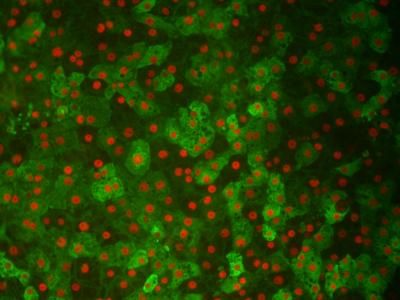Researchers find potential treatment for Huntington's disease
Better understanding of synaptic activity may support 'use it or lose it' hypothesis
Advertisement
Investigators at Burnham Institute for Medical Research, the University of British Columbia's Centre for Molecular Medicine and Therapeutics and the University of California, San Diego have found that normal synaptic activity in nerve cells protects the brain from the misfolded proteins associated with Huntington's disease. In contrast, excessive extrasynaptic activity (aberrant electrical activity in the brain, usually not associated with communication between nerve cells) enhances the misfolded proteins' deadly effects. Researchers also found that the drug Memantine, which is approved to treat Alzheimer's disease, successfully treated Huntington's disease in a mouse model by preserving normal synaptic electrical activity and suppressing excessive extrasynaptic electrical activity. The research was published in Nature Medicine.
The research team found that low doses of Memantine reduce extrasynaptic activity without impairing protective synaptic activity. The work was led by Stuart A. Lipton, M.D., Ph.D., director of the Del E. Webb Center for Neuroscience, Aging and Stem Cell Research at Burnham and professor in the department of Neurosciences and attending neurologist at the University of California, San Diego and Michael R. Hayden, M.D., Ph.D., University Killam professor in the department of Medical Genetics at UBC and director of the Centre for Molecular Medicine and Therapeutics at the Child & Family Research Institute.
"Chronic neurodegenerative diseases like Huntington's, Alzheimer's and Parkinson's are all related to protein misfolding," said Dr. Lipton. "We show here, for the first time, that electrical activity controls protein folding, and if you have a drug that can adjust the electrical activity to the correct levels, you can protect against misfolding. Also, this verifies that appropriate electrical activity is protective, supporting the 'use it or lose it theory' of brain activity at the molecular level. For example, this finding may explain why epidemiologists have found that 'using' your brain by performing crossword puzzles and other games can stave off cognitive decline in diseases like Alzheimer's."
In the new study, researchers initially tested nerve cell cultures transfected with mutant Huntingtin protein and found that reducing excessive NMDA-type glutamate receptor activity with Memantine and other antagonists protected the nerve cells (glutamate receptors are the main trigger of excitatory electrical activity in the brain but in excess can cause nerve cell death, a process called excitotoxicity). They also found that normal synaptic activity was protective. Subsequently, they treated Huntington's disease model mice with both high and low doses of Memantine and found that the low doses were protective by blocking pathological extrasynaptic activity, while high-dose Memantine encouraged disease progression because it also blocked the protective synaptic NMDA receptor activity.
"For a long time it's been known that excitotoxicity is an early marker of Huntington's disease," said Dr. Hayden. "However, now we have dissected the mechanism by which this happens, particularly focusing on NMDA receptors outside the synapse. This creates novel therapeutic opportunities to modulate these receptors with potential protective effects on nerve cells."
A small human clinical trial of Memantine for Huntington's disease has also recently shown positive effects. Larger, international clinical trials are now being planned.
























































